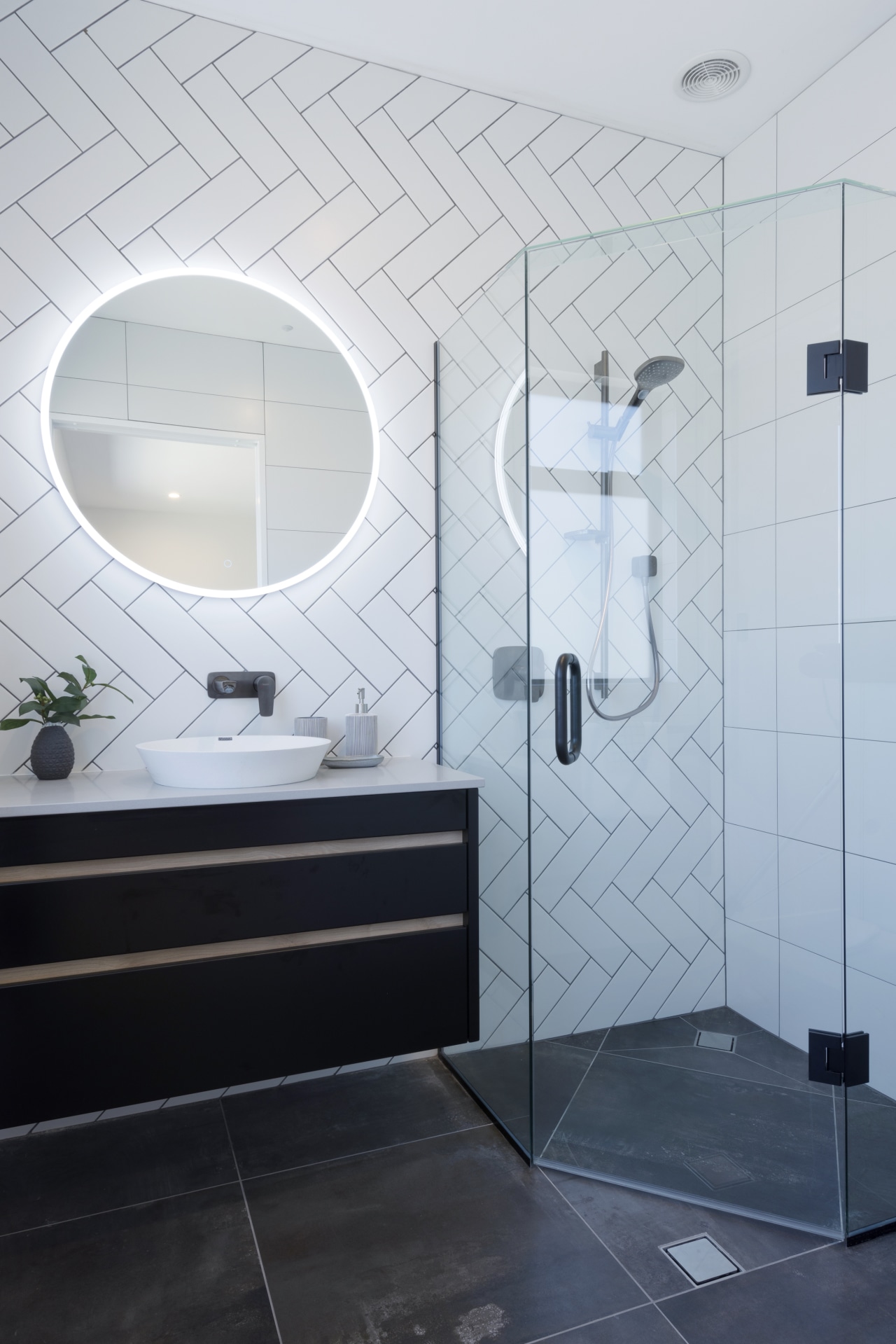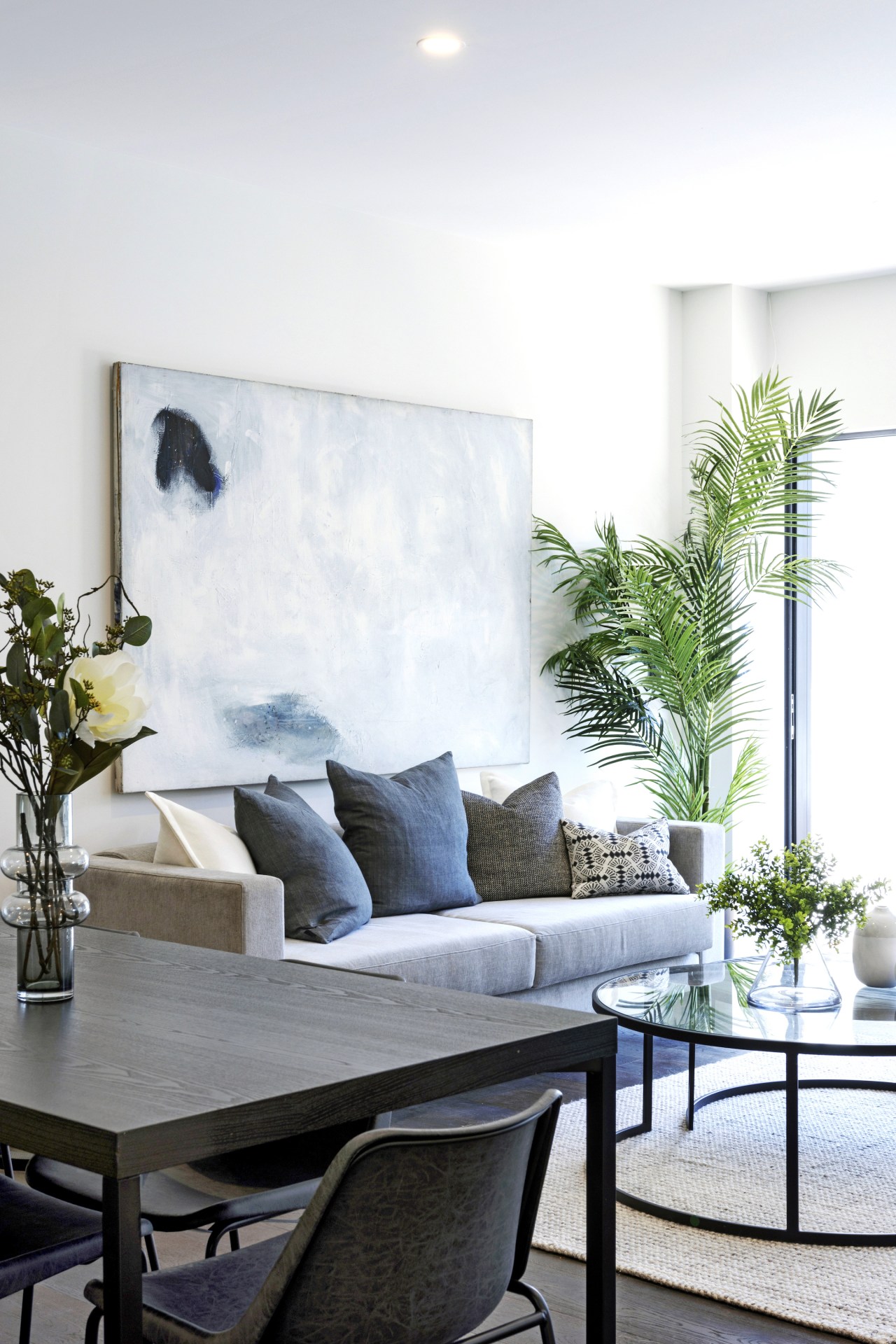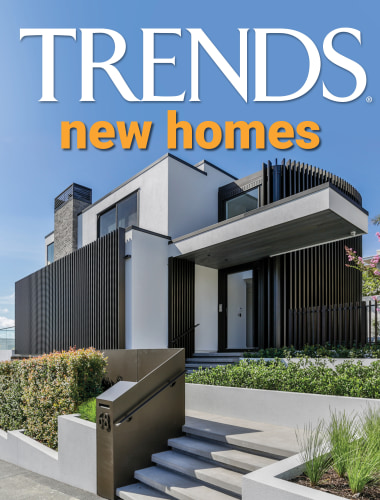Together apart
The times they are a-changing and although some Kiwis still might dream of the quarter-acre, many more are discovering that good things come on small packages of land
Medium density living
Medium-density living has arrived – and Abercrombie Mews in the Auckland suburb of Howick is an exemplar of the form.
For Brett Christie, one-time structural engineer, one-time project manager and now full-time David Reid Homes franchisee/developer, the writing is on the wall.
As is the low-maintenance weatherboard cladding.
And the floor-to-ceiling bathroom tiling.
“We wanted to create the David Reid version of medium density,” Brett says.
By which he means boutique multi-housing projects with a heart of luxe.
New Zealanders may not be familiar with the word ‘mews’: this building typology was established in the well-to-do areas of London when former stable blocks were converted into a row of character houses.
At Abercrombie, the seven terraced homes all speak the same architectural language.
Strung over three levels, the collection of gabled peaks creates the semblance of a village.
High standards come first
Brett Christie is not sure he believes in designing for community – for example using interventions such as common barbecue areas or shared function rooms.
He argues, rather, that when you build to a certain standard with a high level of finish in a location that offers such diverse amenity, community creates itself.
“I can honestly see all the buyers here becoming friends,” he says.
So, while you might expect people nearing retirement to snap up the townhouses – 'who wants to spend weekends mowing lawns?' – or returning expats to see the value in a low-maintenance property close to public transport or in good school zones, you probably wouldn’t expect to find a 20-something first homeowner taking up residence.
Neither, at first, did Brett’s younger brother Tyler Christie.
For younger as well as older
The advertising sales manager and part-time DJ imagined he would be living in London by now, working by day and taking his tunes to the people by night.
And then Covid-19 came along and plans changed: “I watched how beautifully the houses at Abercrombie were being built and I could see how owning here would fit with my lifestyle,” he says.
Tyler’s DJ gigs take him all over Auckland and, since he also works weekends, he needed somewhere that wouldn’t make a constant call on his time.
He got into the development at the ground level, buying a 180m², 4-bedroom property with a single garage off the plans.
He also negotiated a wraparound package with his sibling, which included the supply of furniture.
Then, in the spirit of keeping it a family affair, he worked with Brett Christie’s wife Sarah Christie, who was responsible for designing the interiors.
Tyler’s townhouse is the only one of the seven with no side walls although light does flow in from decking on the other two elevations.
Classic but modern
“The look we were going for was classic but modern – something fresh and up to date,” says Sarah. “Tyler is a young, happening sort of a guy so we wanted the house to feel like an upmarket apartment.”
Against a backdrop of white walls and dark-stained engineered timber flooring, they put together a kitchen to reflect a metropolitan spirit.
“I let Sarah pretty much make her suggestions and trusted her because, having lived in a series of flats, I really have no idea what I do and don’t like,” says Tyler.
Sarah is no fan of plain white kitchens so injected some personality with cabinetry in two shades of grey – ‘Ironsand’ in a woodgrain finish for the overhead cupboards and the lighter ‘Dawn Grey’ tone below.
This teams with a white engineered marble benchtop where dark grey veining keys in with the colour scheme.
Handles and tapware in brushed brass are a point of difference that bring a dash of low-key bling to the room.
This open-plan level flows on past the dining area and the living room, where Sarah ultimately envisions a contemporary but masculine sofa in tan leather, offset by an occasional chair, upholstered in an earthy moss-green corduroy.
The north-west facing deck is oriented for evening sun and Tyler can already envision cocktail hour on evenings when he doesn’t have to head out to hit the digital deck.
Three bathrooms in the home – one on the ground floor and two on the second-floor bedroom level – mean occupants won’t need to fight for the shower.
Just as well.
“My best friend is already signed up as a flatmate,” says Tyler.
Flush shower sills, in-walls cisterns and European tapware in gunmetal grey keep everything sleek and easy-care.
And that’s just the way Tyler likes it.
Now that the furnishing package has arrived – from couches to curtains and even the microwave – he can donate the ad-hoc assembly of items he’s dragged from flat to flat to the charity shop.
On Saturday mornings (okay, let’s get real, closer to-noon) – he can relax on the deck with a coffee or choose to walk three minutes around the corner to the village for brunch.
He may not be where he imagined he’d be right now, but he’s looking forward to taking the next step on this unexpected pathway.
“We believe we are creating something really different here – high-spec homes that will meet a growing market,” says Brett. “Medium-density living is not the way of the future. It is happening right now.”
Medium density: What to look for
Brett Christie shares his buyer’s guide for townhouse projects:
- Make sure the property and the individual home is oriented correctly for sun not only to enjoy passive solar gain but also for easterly morning light (great for kitchens) and evening light (west) for the outdoor living.
- Low-maintenance cladding is imperative, particularly in homes that are multi-level (which terraced houses tend to be). Although you might love cedar or Abodo, a product such as fibre-cement weatherboard requires no painting for around a decade. The last thing you want is to be up on scaffold every two years!
- Although the council has set requirements for insulation and inter-tenancy walls, if your focus is quality look for a company that exceeds these. Specification is key so do your research thoroughly.
- Investigate the ownership set-up of the development. Some might be in a body corp – in which case you will have to factor in an ongoing annual fee; others may be in joint ownership where the owners sign to say they will equally contribute to the maintenance of common areas like driveways. At David Reid Homes, most developments do not have body corp set-ups and houses are titled individually.
- Look for future-focussed design. All the townhouses in Abercrombie Mews have internal garage access and an internal lift which makes it easier to turn this into a forever home.
To find out more about the advantages of medium-density living with David Reid Homes visit the nationwide homebuilder here
You can also see more about this featured home or explore the company's very latest boutique townhouse offering in city fringe suburb Greenlane – another from Brett Christie, David Reid Homes' medium density expert, but be quick, there is only one left.
Check out David Reid Homes' broad range of custom designed homes here
Designed by: David Reid Homes
Story by: Trendsideas
Home kitchen bathroom commercial design
Sculpted by the wind and sun
Light and refined
Expanded presence






